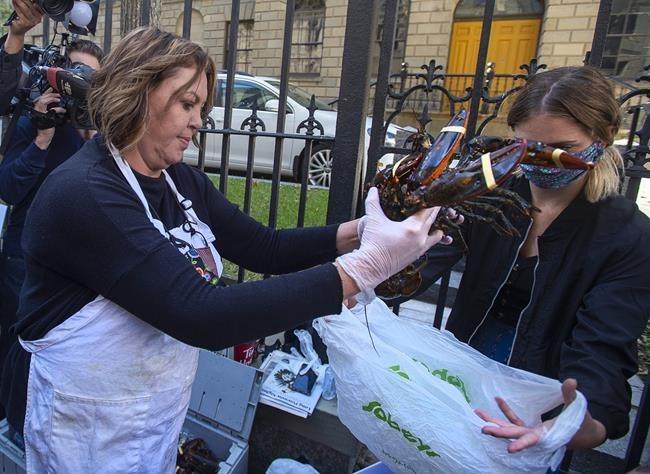HALIFAX — Cheryl Maloney, a Mi'kmaq treaty advocate and member of Sipekne'katik First Nation, stood on a wharf in the rural fishing village in Saulnierville, N.S.
Under a pitch-black sky, Maloney hauled a large lobster crate off a fishing boat and into the trunk of her car to sell in front of the Nova Scotia legislature.
"We're exercising our legal right to hunt and fish and earn a livelihood," she said in an interview. "But the province still says it's illegal for anyone to buy from us."
It's part of a complex web of legal contradictions that has made selling lobster caught through the rights-based fishery nearly impossible for Indigenous communities.
While the highest court in the land has affirmed the treaty right to fish a "moderate livelihood," provincial regulations prohibit buying lobster from someone without a licence.
The muddy rules raise the question of how the Indigenous community will sell crustaceans caught as part of the small-scale fishery.
Individual band members have challenged the contradictory rules by selling lobster off the wharf — or in Maloney's case, in front of a crowd in downtown Halifax.
But with little change since the Supreme Court of Canada's landmark Marshall decision in 1999, Indigenous communities are now trying to come up with a broader solution for how to sell lobster.
Chief Mike Sack of the Sipekne'katik First Nation said the band is working on a plan for buying and selling lobster caught under both its commercial operations and the rights-based fishery.
"We're going to buy our own lobster pound or build one, and we're going to establish our own licence," Sack said.
He said lobsters switch hands multiple times before ending up on a plate. The idea is to try to cut out the middleman.
"There are many steps along the way," Sack said. "The more steps we can cut out, the more money we can make for our community."
There's a lot at stake. Statistics Canada said the total value of Nova Scotia's lobster exports hit nearly $1.2 billion in 2019.
The high stakes have fuelled intense controversy over the moderate livelihood fishery, launched outside the federally regulated season.
Violent attacks against the Indigenous fishery by some non-Indigenous fishers and their supporters have resulted in the destruction of some Mi’kmaq-caught lobster. People who buy lobster or do business with the Indigenous fishers have also been subjected to intimidation and harassment.
Sack said the recent vandalism and loss of potential sales have cost the band more than $1.5 million.
It's a situation being watched closely by Membertou First Nation near Sydney, N.S., which is also planning to launch a self-regulated lobster fishery.
Chief Terry Paul said the community plans on adopting the livelihood fishery plan currently being used by Potlotek First Nation in southern Cape Breton, which was launched earlier this month.
He said the plan was developed by the Assembly of Nova Scotia Mi'kmaw Chiefs so "we all have a part to play in that plan."
"There may be some minor changes, that depends on the discussions we have with the fishers and community members," Paul said, adding that safety and conservation will be top of mind.
Meanwhile, Sipekne'katik First Nation is also developing its own seafood marketing materials.
Once the band finds a market for its lobster, Sack said the community is considering having a special barcode on the packaging.
"You would scan it and it would say, 'This lobster was caught by Mi’kmaq lobster fishermen fishing off St. Mary's Bay,'" he said. "We could even have pictures of the boat and the crew."
But while band councils work on developing community-wide plans for buying and selling lobster, some individual treaty-holders are taking a different approach.
In a bid to challenge provincial regulations, Maloney said she is now planning on selling Mi'kmaq "treaty lobster" more regularly.
She said she's considering selling at an undisclosed roadside location near Halifax — a common practice in a province with an abundance of fresh seafood.
"If there's anybody that is going to be selling it or buying it, it will be considered illegal and it would be the black market," she said. "Maybe if I'm arrested we could challenge this and figure it out once and for all."
This report by The Canadian Press was first published Oct. 22, 2020.
Brett Bundale, The Canadian Press



